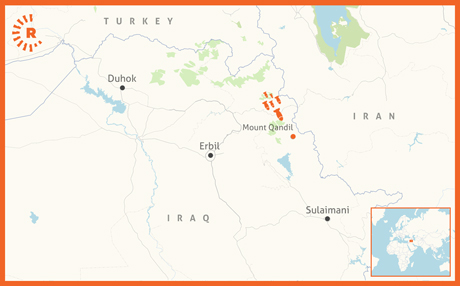PKK confirms death of senior official in Qandil following Turkish airstrike

ERBIL, Kurdistan Region – Diyar Ghareeb, a senior Kurdistan Workers’ Party (PKK) official, was killed alongside two others in a Turkish airstrike on the Qandil Mountains on July 5, the Kurdistan Communities Union (KCK) confirmed Sunday.
“On July 5, Halmat (Diyar Ghareeb), a member of General Leadership Council, was martyred in an airstrike in Qandil along with his comrades Devran and Sahin (Abdulkarim Aslan),” read a statement from the KCK, an umbrella group for the PKK, according to PKK-affiliated media agency ANF news.
The PKK is headquartered in the Qandil Mountains of the northern Kurdistan Region of Iraq. Graphic: Sarkawt Mohammed / Rudaw
Ghareeb had served in their ranks for 25 years, “receiving education from leader Apo [Abdullah Ocalan],” the PKK’s jailed founder, the statement added.
Turkish media reported the death of Ghareeb on Sunday, but gave a different date for the joint Turkish Armed Forces (TSK) and Turkish intelligence (MIT) operation they claim killed him.
According to the Turkish state-owned outlet Anadolu, the operation took place on June 27, a date which coincides with an airstrike on Qandil which resulted in the death of four civilians and the injury of five others.
Ghareeb was one of the seven executive members of the KCK. He previously co-chaired the Kurdistan Democratic Solution Party (PCDK).
He was also a parliamentary candidate for the Kurdistan Region Parliament on a PCDK ticket in 2013, but did not win.
His party was later banned in the Kurdistan Region.
Ghareeb was the KCK official who confirmed the capture of several Turkish intelligence agents in Sulaimani in 2017. Their capture led to an air embargo on the province as the Turkish government accused the dominant Patriotic Union of Kurdistan (PUK) of aiding and abetting the PKK.
However, Ghareeb said they refrained from making the arrests public because they did not want to put the administration in Sulaimani or the PUK into a difficult position.
Turkey launched Operation Claw in the Khakurk area on the Turkish border with the Kurdistan Region on May 27. It claims to have “neutralized” dozens of PKK fighters – a term used to denote captured, wounded, or killed.
The PKK and Turkish state have been locked in a decades-long military conflict, resulting in the death of roughly 40,000 people, including civilians.
They reached a ceasefire deal in 2013 which lasted for more than two years, but deadly fighting soon resumed in the Kurdish provinces in southeast and eastern Turkey.
Turkish forces retook several of these areas from the PKK.
Some 4,472 people have been killed since the peace process fell apart on July 20, 2015, according to the most recent figures from the International Crisis Group (ICG).
After Turkish authorities recently allowed jailed PKK leader Ocalan to meet his lawyers and relatives, following years of solitary confinement, a new peace process appeared possible.
In an op-ed for the Washington Post published July 3, Camil Bayik, one of the five founders of the PKK and a senior commander of the group, said they “are committed to negotiating a political solution of the Kurdish question within Turkey’s borders”.
He claimed that Turkish President Recep Tayyip Erdogan “now sees the democratic revolution of the Kurds in Syria and the defeat of the Islamic State as a threat to the Turkish state’s Kurdish policy and his own authoritarian grip on power.”
Bayik admitted they had made mistakes when addressing the issue.
“We have made our own mistakes in addressing these challenges. We were naive to think that the Kurdish question would be solved solely through dialogue with Erdogan’s party.”

